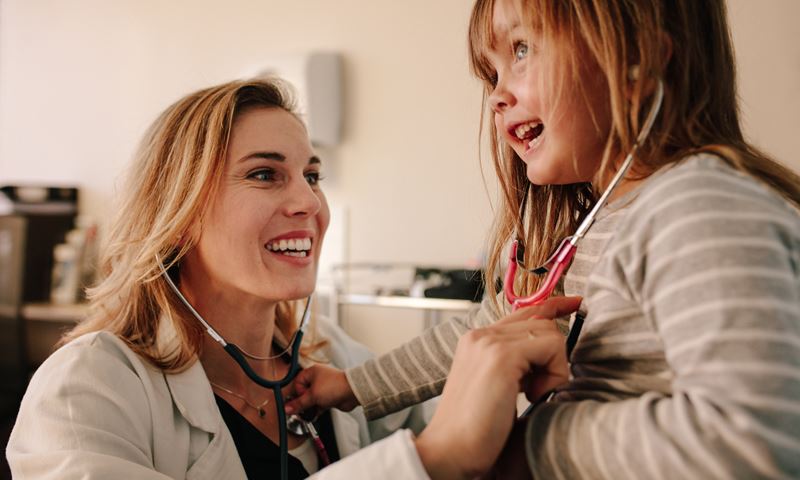GMHBA is now a health care company as well as a health insurer, delivering eye care, dental care and general practice services, and offering members a range of health and wellness services. GMHBA General Manager of Health Services, Dr Sarah Leach explains why prevention, early intervention and individualised care is so important.
GMHBA Exec Sarah Leach

GMHBA is now a health care company as well as a health insurer, delivering eye care, dental care, general practice, and offering members a range of health and wellness services. We also have a strong community program with a focus on improving the health of our community. GMHBA General Manager of Health Services, Dr Sarah Leach explains why prevention, early intervention and individualised care is so important.
Primary Care
Why are GMHBA now providing health care services such as eye care, dental care and general practice services?
We know that early screening and identification of chronic disease is so crucial in reducing the burden of disease in our community and the demand on our hospital system. That’s why GMHBA has invested in primary care practices such as eye care, dental care and general practices in Geelong and parts of regional Victoria.
Who can access these services?
These services are available to all people living in these communities, regardless of whether they are GMHBA members or not, and all patients receive high quality clinical care that is tailored to their own personal health care needs. GMHBA members are also able to access some of our eye care services at a discounted cost depending upon their level of health insurance cover.
What are some of the initiatives that GMHBA is implementing in these services?
We are very pleased to now be commencing a health coaching services in our GP practices – Lara Medical Centre and South Barwon Medical Centre. We have specially trained nurses in these practices who can work one on one with patients to assist them to identify their health goals, identify the barriers that are blocking these goals and help them to make positive health changes. Our practices also run ‘walk with a doc’ programs where our patients are invited to walk with some of our doctors and nurses a couple of mornings a week – a great way for patients to keep fit and keep socially connected as well!
Prevention Activities
There are many health issues facing Australians, what are GMHBA’s focus areas?
 The health of our community and members is paramount to us. GMHBA is no longer just engaging with members when they already have a health issue; we actively want to support our members to understand why maintaining and achieving good health is important, and help them to master their health. There are some key areas which we are currently developing, including:
The health of our community and members is paramount to us. GMHBA is no longer just engaging with members when they already have a health issue; we actively want to support our members to understand why maintaining and achieving good health is important, and help them to master their health. There are some key areas which we are currently developing, including:
- improving people’s health literacy;
- maintaining bone and joint health;
- improving nutrition;
- increasing physical activity, and
- maintaining good mental health.
There’s a lot of health messaging out there, why are GMHBA focussing on this?
We know that people value their health and want to do more, but they are often overwhelmed at all of the messaging that’s out there. We want to focus in on what’s important, and provide our members with information that is evidence-based and practical, and give them tools to make real change. We deliver this content through our ‘Great Health’ e-magazine and are currently developing content for our website.
What are some of the health literacy initiatives GMHBA are delivering?
We have a really strong health seminar program that we are delivering to members and the community in Geelong and regional cities such as Warrnambool, Bendigo and Ballarat. Recent seminars have included presentations from Deakin Professor Felice Jacka on the importance of food in improving mood and Dr Richard Chambers speaking on sleep and mental health. These seminars provide attendees with real strategies that they can use to achieve good mental health. An upcoming ‘Behaviour Change’ seminar will provide members with an understanding of the common barriers that can block good health behaviours, and give them practical strategies that they can implement to achieve their personal health goals.
You’ve also commenced some health screening activities – what do these involve?
We know that people don’t get to their GP for regular health check-ups as often as they should, so we’ve developed a health screening service that gives participants a snapshot of some key health metrics – blood pressure, cholesterol, blood glucose, BMI, and whether any of these measures indicate risk factors that warrant following up with their GP. We’ve done a couple of health screening activities in Ballarat, and plan to run more of these in Geelong and other regional areas in the coming year.
Why is bone and joint health important?
With an ageing population, maintaining healthy and strong bone and joint health is critical. We’ve heard firsthand from members how debilitating arthritis can be, in particular the impact it has on the quality of day to day life. Hip and knee joint replacements are the second highest non-fatal burden of disease for Australians (Australian Institute of Health and Welfare, 2016) and our highest claims cost. Osteoporosis affects over 1.2 million Australians and can result in fractures. Early identification and action can be extremely effective in managing osteoporosis, so we are promoting a screening tool developed by Osteoporosis Australia and strategies our members can implement to improve their bone health.
Why is improving nutrition a key focus?
Cardiovascular disease is the second highest contributor to GMHBA’s hospital admission costs. If the average consumption of vegetables increased by just 10 per cent, the risk of cancer and cardiovascular disease would decrease, and health expenditure in Australia would drop by $99.9 million (Deloitte Access Economics , 2016).
We have offered some great nutrition seminars over the last 12 months with highly regarded speakers such as Dr Joanna McMillan, and Deakin University’s Professor Felice Jacka. We recently ran a ‘Try for 5’ vegetable challenge which encouraged participants to increase their vegetable intake during a three-week challenge. We were pleased to see that 94% of participants reported an increase in their vegetable intake over the course of the challenge. We are planning more nutrition activities, so stay tuned!
What about physical activity?
It seems an obvious one, but we need to move more. Physical inactivity is among four leading contributors to diseases such as coronary heart disease, diabetes, bowel and breast cancer and stroke (Australian Institute of Health and Welfare, 2016). Our AIA Vitality program encourages and rewards members for engaging in health checks and daily physical activity such as walking, and GMHBA is providing community leadership to the which aims to make Geelong Australia’s most active city.
Mental health is an important and extremely personal topic, what are you working on in this area?
In any one year, 1 in 5 Australians will experience mental illness, and 1 in 4 will experience mental illness at some point in their lives. 65% of people who experience mental disorders receive no treatment at all (Beyond Blue, 2008). We know that this impacts our members significantly and we want to do more in assisting them to navigate this very difficult issue. We are currently developing a Mental Health strategy that will drive our prevention activities and services in this complex area.
We are also in talks with Deakin University’s Food & Mood Centre regarding the development of a food and mood program for members, and have been fortunate to have Deakin’s Professor Felice Jacka run some health seminars for members on the link between food and mood.
Learn more about our health programs here www.gmhba.com.au/health

